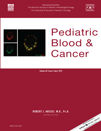A novel Dutch mutation in UNC13D reveals an essential role of the C2B domain in munc13-4 function†
Conflict of interest: Nothing to declare.
Abstract
Background
UNC13D, encoding the protein munc13-4, is essential in intracellular trafficking and exocytosis of lytic granules. Mutations in this gene are associated with familial hemophagocytic lymphohistiocytosis type 3 (FHL3), a genetically heterogeneous, rare autosomal recessive immune disorder. How mutations affect function of munc13-4 is poorly understood. Since 2006 we genetically identified seven FHL patients with mutations in UNC13D.
Procedures
Here, we report for the first time a c.2695C>T (p.Arg899X) mutation in exon 28 of UNC13D in three young unrelated Dutch patients. The mutation causes a premature stop codon and encodes munc13-4(1–899), which lacks the C-terminal C2 domain. Genealogical research and haplotyping of the patient families demonstrated that a single ancestral founder introduced the mutation in the Netherlands. We then characterized the mutant protein phenotypically in cell biological and immunological assays.
Results
Munc13-4(1–899) was correctly targeted to CD63-positive secretory lysosomes, although its stability was reduced and dynamic turnover on the granule membrane became uncoupled from receptor signaling. In accord, and in contrast to wild-type munc13-4, ectopically expressed mutant failed to rescue degranulation in cells with silenced endogenous munc13-4.
Conclusions
The functional and clinical data showed that this novel Dutch founder mutation leads to severe early onset of FHL3 due to misfolding and degradation of munc13-4(1–899). Pediatr Blood Cancer 2012; 58: 598–605. © 2011 Wiley Periodicals, Inc.




